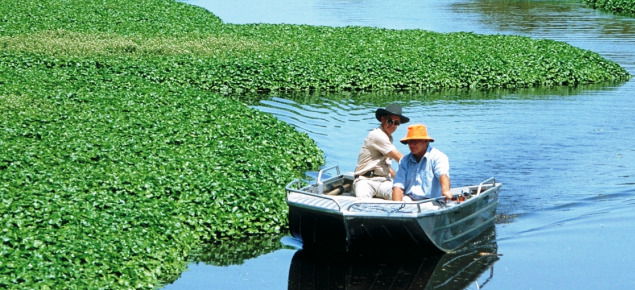Department of Agriculture warns of invasive plant species spreading in state
by July 24, 2024 6:01 am 1,022 views

The Arkansas Department of Agriculture has issued a public service announcement to raise awareness about the presence and potential threats posed by invasive plant species recently identified in Arkansas. The three are cogongrass (Imperata cylindrica), Manchurian wild rice (Zizania latifolia), and water hyacinth (Eichhornia crassipes).
Invasive species, whether plants, animals, or other organisms, are non-native to an ecosystem and can cause significant economic, environmental, or health-related harm upon introduction.
The Arkansas Department of Agriculture, through various programs and in collaboration with the U.S. Department of Agriculture Cooperative Agricultural Pest Survey Program, actively monitors and surveys for invasive species to mitigate their impact.
“We urge Arkansans to remain vigilant against the spread of these invasive species,” said Scott Bray, director of the Arkansas Department of Agriculture’s Plant Industries Division. “Through ongoing surveillance and public awareness efforts, we aim to protect our state’s natural resources, agricultural lands, and native ecosystems from the harmful impacts of invasive species.”
Initially discovered along Highway 49 near Helena-West Helena in June 2021, cogongrass is a perennial grass native to Southeast Asia. Known for its aggressive spread via rhizomes and wind-borne seeds, this invasive plant has become a serious threat to pastures, fallow fields, and natural habitats across the Southern United States.
Efforts to eradicate cogongrass in Arkansas are ongoing, highlighting its persistence and destructive potential. The ornamental variety known as Japanese blood grass or Red Baron poses a similar threat, as it can revert to its invasive parent form and rapidly invade yards and gardens.
Recently discovered growing in a vacant lot in Stuttgart, Manchurian wild rice is a large perennial aquatic grass native to Asia. It can reach heights of up to 12 feet and thrives in stagnant ponds and poorly drained soils.
Efforts to eradicate this invasive species are underway due to its potential to disrupt native wetland ecosystems and impact agricultural areas, including rice production zones. Although genetically distinct from domestic rice (Oryza sativa), concerns remain about potential cross-contamination and the introduction of new diseases or pests harmful to Arkansas’s rice industry.
Illegally sold on social media platforms, water hyacinth is a floating aquatic plant native to South America. Despite misconceptions about its winter hardiness in Arkansas, this invasive species can survive and overwinter in various parts of the state, forming dense mats that choke water bodies and disrupt local ecosystems. It is illegal to buy, sell, trade, gift, or use water hyacinth in landscaping due to its rapid spread and ecological impact.
Residents are urged to properly dispose of any water hyacinth and prevent its further spread by avoiding transportation via boats or equipment that may inadvertently introduce it to new locations.
